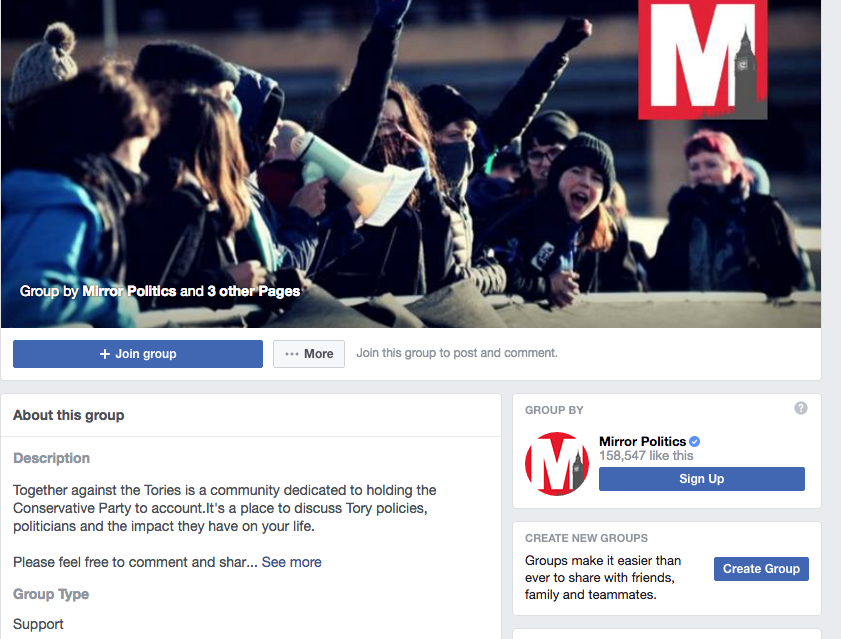
Top UK news brands have set up Facebook page groups following changes to the social network’s News Feed platform that shift focus away from news and towards “meaningful social interactions”.
Facebook’s groups for pages feature – which allows page owners, including news publishers, to set up groups with their official pages – was launched in July last year.
Earlier this month, Facebook said it was dropping news content from five per cent of the News Feed to four per cent and looking to prioritise content from “trusted news brands” defined by its community of users.
It appears that UK publishers are setting up page groups for reader conversations and article sharing to work around these changes.
Mail Online, the Mirror, the Independent, the Financial Times and Ladbible have all created page groups in the last month, Press Gazette has found.
The Times, The Sun, Unilad, the i Paper and Huffpost UK also have long standing page groups.
Head of social media at Mirror Online, Yara Silva said: “We’ve got six page groups right now, but most of them are tiny.
“We launched them off the back of Facebook’s new announcement, thinking it would be a good way to create more meaningful social interactions, because that’s what Facebook are telling us that they are prioritising.
Asked about engagement from these groups, Silva said: “Our new [group] we launched ten days ago called Manchester United on My Mind … that’s grown incredibly quickly.
“It’s currently got 376 members and the engagement on that is really good. People on that are posting their own content.”
But, she added: “The aim isn’t to replace our pages.
“We haven’t changed our page strategy drastically, but we are incorporating groups now into the day-to-day role of the social media editor so that we have another way of using Facebook.”
She added that the Mirror Online had put less focus on Facebook and more on other social platforms such as Twitter, LinkedIn and Instagram.
Asked if she was worried about Facebook-owned Instagram making a similar decision to demote news content, Silva said: “With any platform we’re at the mercy of what they decide, and they’re businesses.
“They’re trying to do what’s best for their business, so if they make that decision we just have to comply and work around it.”
She said Mirror Online had a good relationship with Facebook, saying they had been “quite forthcoming” about changes to its platform.
But, she said the Mirror was not going to focus too heavily on groups, in case similar changes were made to group content.
Huffpost UK social media editor Becky Barnes told Press Gazette that Facebook groups helped publishers to “create a community that really cares about specific subjects, that translated to “really good engagement with your journalism”.
She said: “At HuffPost, we’ve had a diversified, multi-platform strategy for some time and are constantly evolving to best serve our audiences with quality content wherever they are.
“The recent changes announced at Facebook, mean that it’s more important than ever to continue our focus on audience and person-to-person sharing, whilst being mindful of how the changes may impact on publishers.”
The Sun head of social James Manning pointed out that the paper was “having some early success” with Facebook groups.
A group set up four months ago by The Sun Money focusing on “money saving tips” has 2,560 members.
Manning added that The Sun was going to expand on the five page groups it has online.
Unilad chief executive Liam Harrington told Digiday that following the changes to Facebook’s News Feed “there will be a shift in storytelling approach”.
He added: “Before, [Facebook] was optimized for sharing – now, posts will be optimized for conversation, like asking questions at the end of a video.”
Several news brands have set up conversation groups. The i Paper readers’ group acts as a forum for the title’s readers to share feedback on the paper and its coverage.
The Financial Times has a book club group while The Times and Sunday Times run a film club through their shared Screen Times page group.
Some publications seem to be using these discussion groups to share articles from their websites.
The Independent has a page group for the TV series Britannia, in which the paper has shared several of its own articles on the programme.
The Mirror is linking to articles from its politics team on a political group named Together against the Tories.
Mail Online is also using a similar group on Donald Trump to share stories about the US President.
The reach of these page groups varies, a Mail Online Brexit group created on Monday has 32 members while The Independent’s Brexit group, set up a month ago, has 122 members.
Unilad shares its content on a host of page groups covering topics from fitness and travel to sport and gaming. Most have more than 1,000 members.
Its travel page, Unilad Adventure Group, has more than 11,000 members.
Traditional news brand groups, by comparison, have rarely broken the 1,000 members mark.
Press Gazette understands that because the News Feed update prioritises content that encourages “meaningful interactions” between users, content from groups, which are good at fostering discussion, is likely to fare well.
However, groups will not automatically push publisher content higher up in a user’s News Feed.
Picture: Facebook/Screenshot
Email pged@pressgazette.co.uk to point out mistakes, provide story tips or send in a letter for publication on our "Letters Page" blog
